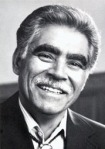(Note: This post was updated to include the Junot Díaz award from the MacArthur Foundation.)
It’s October, and that means news books, book festival season and Dias de los Muertos. Find out more below:
 Already out: Sesame Street actress Sonia Manzano’s young adult novel The Revolution of Everlyn Serrano depicts a Puerto Rican teen growing up in Spanish Harlem in the turbulent 1960s. Manzano talked to the TBD website about the book.
Already out: Sesame Street actress Sonia Manzano’s young adult novel The Revolution of Everlyn Serrano depicts a Puerto Rican teen growing up in Spanish Harlem in the turbulent 1960s. Manzano talked to the TBD website about the book.
• Oct. 1: Guadalupe García McCall, author of the Pura Belpre winning book Under the Mesquite, releases Summer of the Mariposas, a retelling of Homer’s The Odyssey through the eyes of five sisters.
 • Oct. 2: Sandra Cisneros writes about her missing cat in the illustrated book, Have You Seen Marie?
• Oct. 2: Sandra Cisneros writes about her missing cat in the illustrated book, Have You Seen Marie?
• Oct. 9: In the young adult novel A Thunderous Whisper by Christina Díaz Gonzalez, a 12-year-old girl is caught up in spying during the Spanish Civil War.
• Oct. 16: Benjamin Alire Saenz releases a collection of short stories, Everything Begins and Ends at the Kentucky Club. In The Miracle Cures of Dr. Aira by Cesar Aira, a doctor discovers he has superhuman powers.
 • Junot Díaz alert:
• Junot Díaz alert:
Junot Díaz was awarded the prestigious MacArthur “Genius Award” on Oct. 1. The honor is given by the MacArthur Foundation to outstanding individuals in the arts, humanities and sciences.
Need a Junot Díaz fix? Lots of people do since his collection of short stories, This Is How You Lose Her, was released last month. Nearly a thousand fans crammed into a New York City Barnes and Noble, causing a near riot, according to the ColorLines website. He chatted with The New York Times Magazine’s recent “Inspiration” issue about what has influenced his writing, and a nice slideshow is included. He talked about the main character’s game to NPR; his Dominican background to NBC Latino; genre fiction to Capital New York; and the perceived sexism in his book to The Atlantic. He also went bar-hopping with Grantland. But wait, here’s more articles from Latina magazine, the NPR radio show Latino USA, Huffington Post, the Good Reads website and CNN. Here’s some podcasts from The New York Timesand the Brooklyn Vol. 1 website, where Díaz discusses his passion for comic books. He talked about his love for the Hernandez brothers (of Love and Rockets fame) to the NPR radio program Latino USA. Still can’t get enough of Díaz? Check out his Facebook feed or the new fan website, Junot Díaz Daily.
 Book Festivals:
Book Festivals:
• Oct. 1-6: The San Diego City College Int’l Book Fair will include Reyna Grande (left), Gustavo Arellano, Rudy Acuña, Matt de la Peña and Herbert Sigüenza.
• Oct. 13 – The Los Angeles Latino Book & Family Festival will feature Victor Villaseñor and Luis J. Rodriguez.
 • Oct. 27: The Boston Book Festival will feature Junot Díaz and Justin Torres, right.
• Oct. 27: The Boston Book Festival will feature Junot Díaz and Justin Torres, right.
Oct. 27-28: The Texas Book Festival in Austin will feature Gustavo Arellano, Nora de Hoyos Comstock, Junot Díaz, Reyna Grande, Diana López, Domingo Martinez, Guadalupe Garcia McCall, Benjamin Alire Sáenz, René Saldaña Jr., Esmeralda Santiago, Ilan Stavans, Duncan Tonatiuh, Juan Pablo Villalobos, Ray Villareal and Gwendolyn Zepeda.
 Literary magazines:
Literary magazines:
• Aztlan Libre Press has released the book Nahualliandoing Dos: An Anthology of Poetry, which was influenced by Cecilio Garcia-Camarillo, Caracol and Nahualliandoing.
• Here’s an interesting article from Ploughshares literary magazine from Jennifer De Leon (no relation) about whether to italicize foreign phrases in literary works, with a mention of Junot Díaz (him again!).
Events:
• Las Comadres Para Las Americas will host a writer’s workshop Oct. 6 in New York City. Speakers include Sonia Manzano, Lyn DiIorio, and Caridad Pineiro.
• The Festival de la Palabra, which includes discussions and readings from from Rosa Beltrán, Ángel Antonio Ruiz Laboy and Charlie Vásquez, takes place Oct. 9-11 in New York City.
 Other news:
Other news:
• The Southern California public radio station KPCC covered a reading of Ban This! The BSP Anthology of Chicano Literature, written in response to the state of Arizona’s ban on ethnic studies.
• Poet Lupe Mendez was named one of the Houston Press’s top 100 creative people.
 • Héctor Tobar’s 2011 novel The Barbarian Nurseries may be adapted into a movie, according to ComingSoon.net.
• Héctor Tobar’s 2011 novel The Barbarian Nurseries may be adapted into a movie, according to ComingSoon.net.
• The film version of Rudolfo Anaya’s Bless Me Ultima premiered in El Paso, according to the El Paso Times.
• A new film based on Juan Gonzalez’s Harvest of Empire: A History of Latinos in America is being released.
• Justin Torres, author of 2011’s We the Animals, was named to the National Book Founationa’s 5 under 35 list of emerging authors.
 Also this month:
Also this month:
• Celebrating birthdays this month: Nobel Prize winner Miguel Angel Asturias, right, on Oct. 19.
• The Nobel Prizes will be announced this month, and Book Riot has its predictions. (It’s not likely a Latino or an American will win this year.) Here’s a look at Latinos who’ve won the award.
• Looking for some books for Dias de los Muertos? Here’s The Hispanic Reader’s round-up from last year.
 California: Luiz Valdez, right, the father of Latino theater and playwright of “Zoot Suit,” began presenting plays during the Delano farmworkers strike. The plight of farmworkers in California have been the subject of books by Helena María Viramontes and Pam Muñoz Ryan. Other Californians include Gustavo Arellano, Margarita Engle, Alex Espinoza, Reyna Grande, Gilbert Hernandez, Lorraine López, Luis J. Rodriguez, Michele Serros, Gary Soto, Héctor Tobar and Victor Villaseñor.
California: Luiz Valdez, right, the father of Latino theater and playwright of “Zoot Suit,” began presenting plays during the Delano farmworkers strike. The plight of farmworkers in California have been the subject of books by Helena María Viramontes and Pam Muñoz Ryan. Other Californians include Gustavo Arellano, Margarita Engle, Alex Espinoza, Reyna Grande, Gilbert Hernandez, Lorraine López, Luis J. Rodriguez, Michele Serros, Gary Soto, Héctor Tobar and Victor Villaseñor.  New Mexico: Native son Rudolfo Anaya, left, considered the father of Chicano literature, has set his novels, including his beloved Bless Me Ultima and Sonny Baca mysteries, in this state. The state also served as the setting for novels by Ana Castillo, Denise Chávez and Alisa Valdes.
New Mexico: Native son Rudolfo Anaya, left, considered the father of Chicano literature, has set his novels, including his beloved Bless Me Ultima and Sonny Baca mysteries, in this state. The state also served as the setting for novels by Ana Castillo, Denise Chávez and Alisa Valdes. Puerto Rico: The Caribbean island joined the United States in 1898. Esmeralda Santiago, right, wrote about her personal history in When I Was Puerto Rican and the island’s history in the novel Conquistadora. Other authors of Puerto Rican heritage include Lyn DiIorio, Sarah McCoy, Piri Thomas, Justin Torres and Willliam Carlos Williams.
Puerto Rico: The Caribbean island joined the United States in 1898. Esmeralda Santiago, right, wrote about her personal history in When I Was Puerto Rican and the island’s history in the novel Conquistadora. Other authors of Puerto Rican heritage include Lyn DiIorio, Sarah McCoy, Piri Thomas, Justin Torres and Willliam Carlos Williams. Texas: Life on the border has served as fodder for books by Rolando Hinojosa, left, of the Rio Grande Valley, and Sergio Troncoso of El Paso. Sandra Cisneros, originally from Chicago, set her books Woman Hollering Creek and Have You Seen Marie? in this state. Other Tejanos include Dagoberto Gilb, Manuel Gonzales, Diana López and Gwendolyn Zepeda.
Texas: Life on the border has served as fodder for books by Rolando Hinojosa, left, of the Rio Grande Valley, and Sergio Troncoso of El Paso. Sandra Cisneros, originally from Chicago, set her books Woman Hollering Creek and Have You Seen Marie? in this state. Other Tejanos include Dagoberto Gilb, Manuel Gonzales, Diana López and Gwendolyn Zepeda.  The country’s most prestigious literary award, the Pulitzer Prize, has been given to Cuban-American Oscar Hijuelos and Dominican-American Junot Díaz, right, in the fiction category; Cuban-American Nilo Cruz and Quiara Alegría Hudes, who is of Puerto Rican descent, in drama; and numerous journalists. Eduardo Lalo won the 2013 International Rómulo Gallegos Prize for Fiction, becoming the first American to win one of Latin America’s most prestigious literary awards. The Pura Belpré Award, given by the American Library Association, honors books written for young readers.
The country’s most prestigious literary award, the Pulitzer Prize, has been given to Cuban-American Oscar Hijuelos and Dominican-American Junot Díaz, right, in the fiction category; Cuban-American Nilo Cruz and Quiara Alegría Hudes, who is of Puerto Rican descent, in drama; and numerous journalists. Eduardo Lalo won the 2013 International Rómulo Gallegos Prize for Fiction, becoming the first American to win one of Latin America’s most prestigious literary awards. The Pura Belpré Award, given by the American Library Association, honors books written for young readers.



























